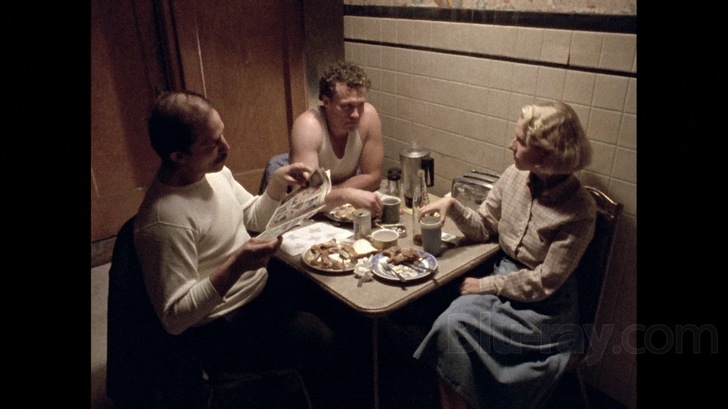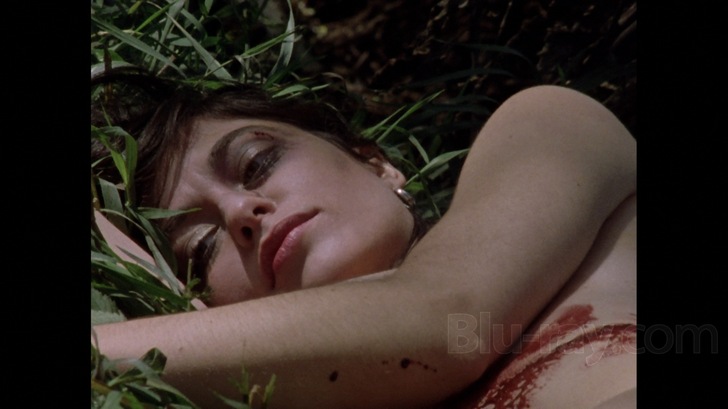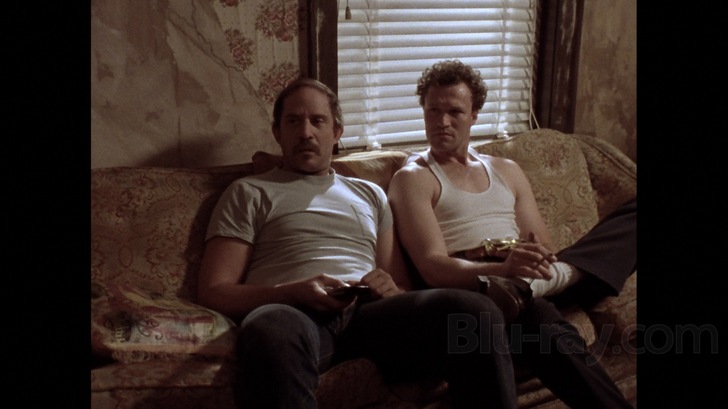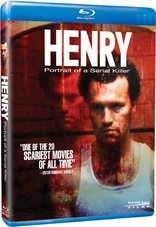Henry: Portrait of a Serial Killer Blu-ray Movie
HomeHenry: Portrait of a Serial Killer Blu-ray Movie 
MPI Media Group | 1986 | 86 min | Unrated | Sep 29, 2009Movie rating
7.5 | / 10 |
Blu-ray rating
| Users | 4.7 | |
| Reviewer | 3.5 | |
| Overall | 4.2 |
Overview
Henry: Portrait of a Serial Killer (1986)
Henry is a soft-spoken loner with a cool exterior masking an inner rage that boils at blast furnace intensity. When fellow ex-con Otis invites Henry to move into his Chicago apartment, he becomes a willing participant in Henry's senseless, random killing sprees. Meanwhile, Otis' unsuspecting sister, Becky, is smitten with Henry, whose broken childhood mirrors her own.
Starring: Mary Demas (I), Michael Rooker, Anne Bartoletti, Elizabeth Kaden, Ted KadenDirector: John McNaughton
| Horror | Uncertain |
| Mystery | Uncertain |
| Thriller | Uncertain |
| Crime | Uncertain |
| Drama | Uncertain |
Specifications
Video
Video codec: VC-1
Video resolution: 1080p
Aspect ratio: 1.33:1
Original aspect ratio: 1.33:1
Audio
English: LPCM 2.0 (48kHz, 16-bit)
Subtitles
English
Discs
25GB Blu-ray Disc
Single disc (1 BD)
Playback
Region A (locked)
Review
Rating summary
| Movie | 3.5 | |
| Video | 3.5 | |
| Audio | 3.0 | |
| Extras | 3.0 | |
| Overall | 3.5 |
Henry: Portrait of a Serial Killer Blu-ray Movie Review
Gore-fest meets art-house in John McNaughton’s low-budget shocker.
Reviewed by Casey Broadwater October 6, 2009In cinema, if violence is entertaining it’s usually because it’s unrealistic. We clap when a survivor dispatches a zombie with a satisfying headshot, scream with squeamish delight as a masked slasher deals an original deathblow, and hold our breath waiting for the bad guys to get their bloody comeuppance. Dramatic conventions have a distancing effect, allowing on-screen violence to heighten or expunge emotion without the sickening consequences of real-life bloodshed. The outcome is much different, however, when a film tries to present violence as it actually is—chaotic and senseless, brutal and unnecessary. Henry: Portrait of a Serial Killer opts for the latter, objectively examining a week in the life of an unrepentant murderer. Ultimately, Henry is not only about violence, but also, in a specifically meta-cinema way, about an audiences’ perception of and reaction to the carnage they’re seeing committed in the film.

The face of a killer...
The movie opens very effectively with a protracted, twisting zoom away from a dead woman, her eyes glassy and unseeing. We then follow Henry (Michael Rooker) as he goes about the mundane details of his daily business—grabbing a meal at a diner, driving around town—shots that are intercut with grim still-life tableaus of other murder victims. When Henry picks up a guitar-toting female hitchhiker, and then returns to his apartment to present the six-string as a gift to his dim-witted roommate Otis (Tom Towles), we’re officially let in on Henry’s macabre profession. Having split with her husband, Otis’ sister Becky (Tracy Arnold) comes to stay with the two men, who met one another during overlapping stints in prison. Becky is a former dancer—not of the reputable sort—and she has a history of sexual abuse, a history that’s constantly repeated by her brother, who eyes her leeringly. When she learns that Henry has a similarly abused past—it’s no surprise to find out his mother was a whore—Becky falls for him. After Henry stops Otis from trying to kiss Becky, the guys go out for a night on the town, the steam-letting culminating with Henry snapping the necks of two prostitutes. What follows is a slowly spiraling descent into depravity, as Henry introduces Otis to the thrills of murder.
Of course, Otis proves to be a star pupil, gunning down his first solo victim with glee in a desolate underpass. The film slowly begins to present Henry as the story’s anti-hero—we don’t exactly root for him, but compared to the lecherous and simian Otis, Henry seems almost intellectual. As they go about their “spree,” there are two moments that typify violence in drastically different ways. When Otis and Henry have an encounter with a black market electronics dealer (Ray Atherton), the build-up to the big moment is purely Hollywood. The dealer repeatedly insults the two, and by the time Henry stabs him with a soldering iron, we’re led to feel, having been manipulated in a characteristically cinematic way, that this guy had it coming, that he deserved it. Minutes later, with no set-up, no rational, we witness a home invasion as videotaped by Henry. We watch the events unfold on a TV—a screen inside our own home theater screens—and as the two men brutally murder a suburban family, we’re given a very different view of violence, one that is strikingly real and genuinely horrifying. As the camera pans away from the screen and toward Henry and Otis, sitting on their couch—as we likely are—we’re made to feel complicit, engaged, like the two murderers, in a feedback loop of cruelty. The commentary is less about violence itself than our willingness to watch it, savor it even, a trait explored more pointedly—and less subtly— in Michael Haneke’s divisive Funny Games.
The film doesn’t exactly transcend the schlock of its decidedly exploitive genre, but writer/director John McNaughton and co-writer Richard Fire imbue the film with unexpected frankness and more dramatic meat than similar fare. I’d even say that the relationship between the three principal characters has more in common with Jim Jarmusch’s Stranger Than Paradise than with the stock stereotypes and situations of your average slasher flick. The film’s most potent exploration is the humanizing effect that Becky has on Henry as she offers him a way out, a chance at normalcy. This is the dangling carrot that propels the plot, and the tension between the two is sustained until the very end. On a technical level, the gritty look matches the film’s $100,000 budget, but with cleaner visuals, I’m not sure Henry would work. The characters inhabit a dismal, seedy squalor, and the performances convincingly reflect the surroundings. Tom Towles is frightening and predictably unpredictable as Otis, and his greasy comb-over and dull teeth are menacing in their own right. Tracy Arnold is the film’s one ray of light, and her presence elevates the material by contrasting the killings with brighter possibilities. It’s Michael Rooker, though, that carries the film with looming unease. Every tick of his face implies latent anger, his taut posture evidence of a man trying desperately to stay in control. His portrait of Henry is realistically painted, forming the centerpiece for one of the most shockingly brutal and original horror films of the 1980s.
Henry: Portrait of a Serial Killer Blu-ray Movie, Video Quality 

Let's not sugarcoat this. Henry: Portrait of a Serial Killer is an ugly film. No matter how much you bump the resolution or tweak with the color timing, it will always be an ugly film. In a sense, though, it's perfectly ugly, with form and function, medium and message serving the same gritty, grime-covered ends. Here on Blu-ray, the film receives a 1080p/VC-1 encoded transfer that shows a slight but appreciable upgrade from prior DVD releases. Colors certainly seem stronger, warmer, and more stable, particularly reds, like Henry's coat and the film's ample blood. As Henry was shot on 16mm, an occasionally heavy grain field buzzes over the image and, by extension, the film isn't exactly sharp by modern standards. Close-ups obviously show more detail than the film's DVD counterpart, but some of the medium and longer shots have a softer, unresolved appearance. Black levels prove to be the film's repeat offender, frequently crushing detail during darker scenes. The daylight segments in downtown Chicago tend to look best, but I was also momentarily impressed by the hood-mounted shot of Henry and Otis driving in the rain, a shot that shows a surprising amount of depth. Still, much of the film has a dull, dingy, depressive look that is an inalienable effect of the low-budget source material. Even dressed up in a high definition transfer, Henry is still a grim and dirty affair, but I can't imagine it being any other way.
Henry: Portrait of a Serial Killer Blu-ray Movie, Audio Quality 

Henry's Linear PCM 2.0 stereo track likewise represents the film well, even if the lo-fi audio capture is less than impressive today. As director John McNaughton reveals in his deleted scenes commentary, only two lines of dialogue were dubbed in post-production. All other lines were captured on-set or on-location, and the result is a somewhat uneven vocal mix. For example, you'll notice some discrepancies in ambient volume as the camera cuts back and forth between two actors. The sound quality during the scene in the underpass sounds flat-out horrible—muffled and indistinct—and I also noticed two instances of slight clipping. Still, the rest of the dialogue is intelligible and mostly clean. The dated score sounds as good as it can—with digital drums and buzzing synth lines—and for a 2.0 mix there's a decent amount of bass. I won't hesitate to say that this is the best that Henry has ever sounded, but it is noticeably inferior to other catalog titles from the mid-1980s.
Henry: Portrait of a Serial Killer Blu-ray Movie, Special Features and Extras 

Commentary by Director John McNaughton
McNaughton is joined on this feature-length track by documentarian David Gregory, who steers
the conversation with thoughtful questions pertaining to thematic material and the film's
production. McNaughton is candid and talkative, and the interview format of the commentary
means there's never a dull moment.
Portrait: The Making of Henry (SD, 52:34)
Through interviews with director John McNaughton, co-writer Richard Fire, co-producer Steven
Jones, and all the principal actors, this new documentary paints a portrait of what it was like to
work on Henry, from the early inspirations for the film to the film's battle with the MPAA.
While there's a degree of overlap with McNaughton's commentary track, fans will appreciate the
perspective of the other cast and crew members.
The Serial Killers: Henry Lee Lucas (SD, 26:19)
As the inspiration for the film, Henry Lee Lucas—known as "The Confession Killer"—murdered
somewhere between 50 and 75 people during his cross-country killing spree with fellow killer
Ottis Toole. Several investigators and police officials tell Henry's story here, along with archival
clips from an interview with Henry himself. Grisly stuff, this.
Deleted Scenes and Outtakes (SD, 21:25)
Since the original sound elements are missing, director John McNaughton provides commentary
for these twenty-odd minutes of deleted scenes, most notably including an awkward and
rightfully excised physical exchange between Henry and Otis.
Interview with John McNaughton, 1998 (SD, 30:44)
Most of the material covered here is dealt with more completely and dynamically in the "making
of" documentary and McNaughton's own commentary track. There's some interesting stuff here
for trivia-heads, but as a whole the interview is fairly dull.
Still Gallery (1080p)
Contains 34 stills, promo pieces, and one-sheets.
Original Storyboards (1080p)
Includes about 80 drawings. Like the Still Gallery, this is user-controlled.
Theatrical Trailer (SD, 1:53)
Henry: Portrait of a Serial Killer Blu-ray Movie, Overall Score and Recommendation 

At first glance, there's nothing fun about Henry: Portrait of a Serial Killer. Dark, realistic, and unflinching, it's definitely not a film you'd put on for your annual Halloween party. Still, there's a vein of coal black comedy running throughout the film if you're willing to mentally mine for it. Henry might not be one of those films that you return to repeatedly, but it looks better than ever on Blu-ray—even if that's not saying much. Hardcore horror-hounds will definitely want to pick this one up, but casual fright fans will probably want to venture a rental. Recommended.
Other editions
Henry: Portrait of a Serial Killer: Other Editions
Similar titles
Similar titles you might also like

Child's Play 4K
1988

Maniac
2-Disc Special Edition
1980

When a Stranger Calls
Retro VHS Collection
1979

Resurrection
1999

The Midnight Meat Train
Unrated Director’s Cut
2008

The Woman
2011

Saw 4K
2004

The Silence of the Lambs
1991

The Stepfather 4K
Collector's Edition
1987

Hellraiser: Inferno
Hellraiser V
2000

10 to Midnight
Collector's Edition
1983

The Stylist
2020

Malevolence
2003

Evidence
2013

Cry_Wolf
2005

Torso 4K
I corpi presentano tracce di violenza carnale | Carnal Violence | Limited Edition
1973

The Killing Kind
Standard Edition
1973

Maniac Cop 2
1990

No Good Deed
2014

The Hitcher 4K
1986

